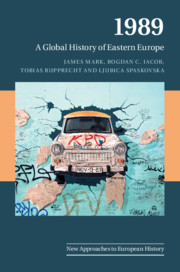1. - Globalisation
Published online by Cambridge University Press: 29 August 2019
Summary
‘1989’ and the dismantling of communist rule was less the beginning of the region’s globalisation than a confirmation of a choice about the form of globalisation that the region would take. Alternative, non-Western-centric forms of global integration were abandoned and neoliberal economics became dominant. Yet this was not a Western imposition: local elites in many bloc countries, responding to shifts in an increasingly financialised and debt-ridden global economy, began a gradual process of realignment long before 1989. In re-imagining the region’s economic future, elites looked as much to East Asia or Latin America as they did to the West. Some considered an authoritarian Communist-led neoliberal globalization which was eventually defeated in 1989. These shifts in part explain why the neoliberal transformation in Eastern Europe after 1989 occurred at such speed.
Keywords
- Type
- Chapter
- Information
- 1989A Global History of Eastern Europe, pp. 25 - 72Publisher: Cambridge University PressPrint publication year: 2019

